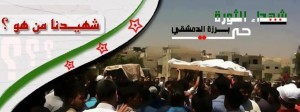In the Presence of Martyrs

Sulaf Zaidan
I shall never forget that sentence – “There’s been a massacre in Barza.”
A funeral was hit by gunfire that day.
I was extremely angry. We were still not as used to killings as we are now, even though by then it was eight months since the start of the revolution.
Many people must, like me, have been asking whether we would be able to hold a public funeral for the martyrs. An announcement was finally made on the Facebook page of Barza’s Local Coordination Committee, LCC, saying, “A funeral procession will start from Al-Salam Mosque after midday prayers tomorrow.”
It was going to be my first visit to Barza, just as it was the first time I had attended a martyr’s funeral. There were not one but five dead.
It was not difficult to spot the mosque because a photo of it had been published on the LCC’s Facebook page. I recognised its arches the moment the minibus went past it.
I reminded myself that there were five martyrs inside the mosque, and that there must be five mothers reliving every moment they had had with their sons.
I did not want to stop even for a second – I wanted to cross that street as fast as I could and mingle with the crowds. Yet at the same time, I was trembling with fear. I was not scared of being arrested or killed – I was going to see a martyr for the first time, and it made me unexpectedly weak.
My eyes were fixed on the mosque door. I tried to guess what was about to happen, but I could not. I tried looking at the faces around me, but they led me back to the mosque door which everybody was looking at. There was complete silence, but the eyes around me told of anticipation.
Standing next to me, a friend told me I should go and join the women, because the men were afraid there might be raid by the security forces. Perhaps they just did not want me among them, I don’t know.
When I went over to the women, they all started staring at me, and then from somewhere I heard a question, “Are you from Barza?”
“No, I’m from Suweida,” I replied.
Everyone looked at me hard. I could see that my answer prompted hundreds of questions. Suweida province was accused of supporting the regime. I just stood there helpless, lonely and embarrassed; unable to respond to any of the accusations I saw in these women’s eyes. I had never felt so much pain.
I hastily collected myself and began trying to tell them that I would stay there even if they objected. Before I had time to go on, however, a lady in her fifties hugged me and sat me down next to her. She told everyone else to leave me alone.
“She is our guest,” she said, “and she will bring blessings on the funeral.” I was unable to say anything, but I realised she did not expect me to thank her.
Another lady came up and whispered in my ear, “She’s the mother of a martyr whose body is inside. He was killed yesterday during his brother’s funeral.”
I missed anything else she might have said, amid everything that was going on. The only thing I saw clearly was the face of this mother of two martyrs. I looked into her eyes to see whether there was any weakness or tears, but all I could see was a mighty lady.
Would I be half as strong as this woman if I had a son who was killed? I do not think so.
“Takbir” – the sudden call to say “Allahu Akbar”, “God is great” – reminded me where I was. I gave a start.
The procession started. I looked for my friend so I could stand next to him. This was not his first funeral, and I thought he would give me strength.
They started taking out the bodies one by one. They held them high, so that nothing but the sky was above them.
I would never have thought I could have ululated for martyrs. Martyrdom was death, and only associated with grief. But with the first sound of ululation, I found myself joining in. The dead man was a bridegroom – everything showed that he was.
We started marching, and I could not help but look back. I was so lucky to be with this crowd. I remembered the face of that mother sitting next to me, and I thought of the killer, so I started shouting incessantly.
Someone suddenly grabbed my arm, making me stop shouting. It was one of the ladies that I had seen at the start.
“You’re a revolutionary without equal, my dear, but please put this scarf over your head,” she said. “There are plenty of informers and I’m worried they might photograph you.”
I do not think she could have given me a better welcome after the misunderstanding we had had. I covered my head with the scarf without protestation, just as I did not object to this day intruding on my life.
